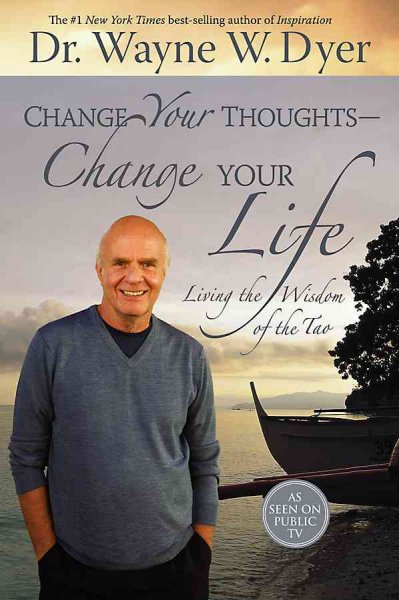In light of Dr Wayne W Dyer’s unfortunate recent passing, I am sharing a few thoughts about one of his most inspiring books that I am blessed to have in my collection: “Change Your Thoughts, Change your Life – Living the Wisdom of the Tao.” (Hay House) In the popular motivational author’s words, “this is a book that will forever change the way you look at life.” But do not take my word for it and read it for yourself.
Change Your Thoughts – Change your Life is a monumental compilation and research of the ancient Chinese text Tao Te Ching (The Great Way). These are not Dyer’s own thoughts and concepts, but represent an interpretation of the Tao Te Ching. He notes: “Writing this book was a complete surrender to ideas that didn’t always seem to fit a linear rational approach, and it has changed me in a way that’s like the Tao itself: unexplainable and unnameable.”
The original Tao Te Ching text is thought to have been written by Chinese master Lao-tzu more than 25 centuries ago. The content of the 81 verses (chapters) of the ancient book is given a new meaning through Dyer’s work. The research and the application of various translations (ten to be exact) of the original text relate to today’s modern world. The book refers to various kinds of existential topics such as simplicity, ego, power, attachment, humility and leadership.
Dr Wayne W Dyer spent one year absorbing the wisdom of the Tao Te Ching before writing these captivating insights, which are his personal interpretations of Lao-tzu’s insights into life, nature and humanity. Furthermore, Dyer includes a simple exercise to understand and apply the ancient wisdom at the end of each interpretation of a chapter/verse, “Do the Tao Now.”
But what is “the Tao”? Dyer sees the Tao as the supreme reality, an all-pervasive Source of Everything. The Tao never begins or ends, and animates everything in the world of form and boundaries. Sounds familiar? In the Tao Te Ching, this world is called “the world of the 10.000 things.” Most predominantly in the western world, we refer to God as our creator – the supreme reality – and our world is life on planet Earth.
In other interpretations, Tao is seen as “the Way”, Te as “the shape and power” and Ching as “book”. Thus, Tao Te Ching means the manifestation of the way and it is the ancient oriental mystical and practical philosophy. The Tao Te Ching’s message is to simply allow yourself to stay in harmony with nature and receive an abundance of extraordinary perceptions. This is no different from our western beliefs and our desire to receive God’s blessings and live an extraordinary, happy and fulfilled life.
I find that every verse of the Tao Te Ching has the power to inspire anyone to live life on Earth in a balanced, moral and spiritual way. I sometimes go back to a specific verse and I am amazed at its profoundness and simplicity. What I find fascinating is that there are a number of various concepts in the Tao Te Ching that are similar to the teachings found in, for example, Christianity (the Bible) and other faiths. I am mentioning but a few by using some of the titles Dyer gave to his interpretations: Living with Awe and Acceptance, Living Humility, Living Beyond Judgement, Living Peacefully, Living Honorably, Living without Sickness, Living without Difficulties, Living by Silent Knowing, Living with Immunity to Evil. However, Tao Te Ching is regarded as a classic text of profound ancient philosophy and does not lend itself to a specific religion or faith.
You can perceive the wisdom of the Tao as a guide to mindfulness and how to understand the world through a different perspective – one in which paradoxical thinking like the Eastern concept of yin and yang (the feminine and the masculine) abounds. It is a fascinating spiritual reading which, in my opinion, has enough universality, versatility and practicability today as it did thousands of years ago.
Most of the modern writings on mindfulness are certainly inspired (more or less) by this ancient wisdom, but I prefer the simplicity and naturalness of the Tao Te Ching. I am not the meditating type, however I go back to reading a few passages from Dyer’s book, once in a while, and do my best to translate the wisdom into practice, as much as I can and in the way I understand it to benefit my life. This book has inspired many positive changes in my life to live in an authentic way and become more attuned to myself, which lead to important decisions I have recently made in my career. Also, the teachings have motivated me to live harmoniously without judgement and to live effortlessly without striving. I am going to write more about conscious and effortless living in future posts.
“I feel the Tao with me, always there, always doing nothing, and always leaving absolutely nothing undone (…) I have a different perspective now: I feel more peaceful and patient.” Dr Wayne W Dyer
